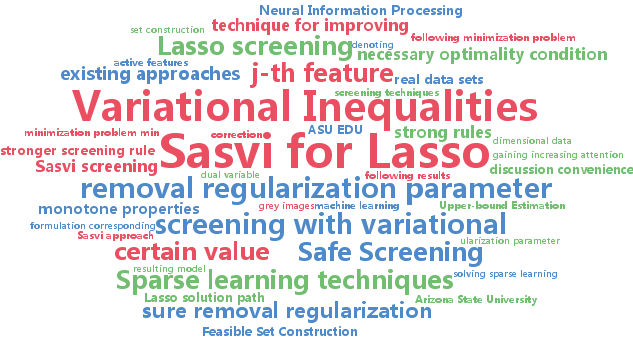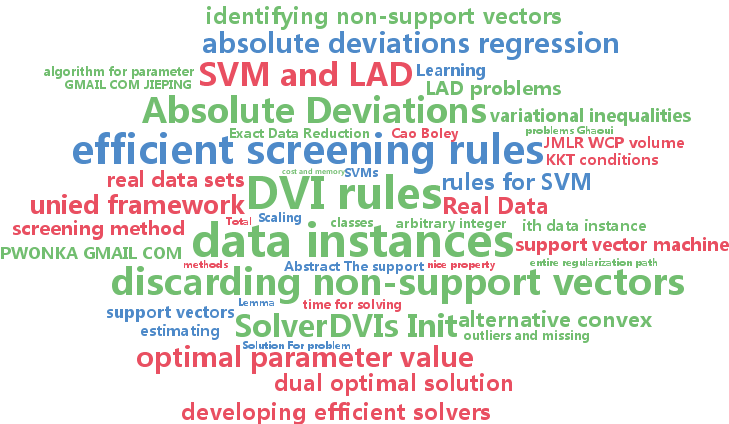variational inequalities
-
Jun Liu and Zheng Zhao and Jie Wang and Jieping Ye
Safe Screening with Variational Inequalities and Its Application to Lasso (pdf)
Sparse learning techniques have been routinely used for feature selection as the resulting model usually has a small number of non-zero entries. Safe screening, which eliminates the features that are guaranteed to have zero coefficients for a certain value of the regularization parameter, is a technique for improving the computational efficiency. Safe screening is gaining increasing attention since 1) solving sparse learning formulations usually has a high computational cost especially when the number of features is large and 2) one needs to try several regularization parameters to select a suitable model. In this paper, we propose an approach called ``Sasvi" (Safe screening with variational inequalities). Sasvi makes use of the variational inequality that provides the sufficient and necessary optimality condition for the dual problem. Several existing approaches for Lasso screening can be casted as relaxed versions of the proposed Sasvi, thus Sasvi provides a stronger safe screening rule. We further study the monotone properties of Sasvi for Lasso, based on which a sure removal regularization parameter can be identified for each feature. Experimental results on both synthetic and real data sets are reported to demonstrate the effectiveness of the proposed Sasvi for Lasso screening.
-
Jie Wang and Peter Wonka and Jieping Ye
Scaling SVM and Least Absolute Deviations via Exact Data Reduction (pdf)
The support vector machine (SVM) is a widely used method for classification. Although many efforts have been devoted to develop efficient solvers, it remains challenging to apply SVM to large-scale problems. A nice property of SVM is that the non-support vectors have no effect on the resulting classifier. Motivated by this observation, we present fast and efficient screening rules to discard non-support vectors by analyzing the dual problem of SVM via variational inequalities (DVI). As a result, the number of data instances to be entered into the optimization can be substantially reduced. Some appealing features of our screening method are: (1) DVI is safe in the sense that the vectors discarded by DVI are guaranteed to be non-support vectors; (2) the data set needs to be scanned only once to run the screening, and its computational cost is negligible compared to that of solving the SVM problem; (3) DVI is independent of the solvers and can be integrated with any existing efficient solver. We also show that the DVI technique can be extended to detect non-support vectors in the least absolute deviations regression (LAD). To the best of our knowledge, there are currently no screening methods for LAD. We have evaluated DVI on both synthetic and real data sets. Experiments indicate that DVI significantly outperforms the existing state-of-the-art screening rules for SVM, and it is very effective in discarding non-support vectors for LAD. The speedup gained by DVI rules can be up to two orders of magnitude.

